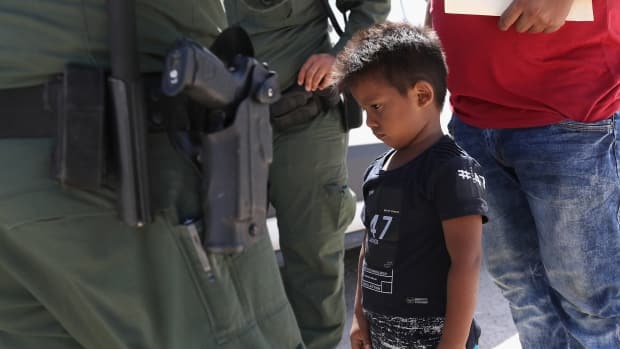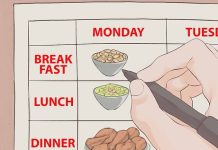[ad_1]
There was no tweet this time. As the world awoke this weekend to the grief-filled images and sounds of a new American policy on asylum seekers that forcibly separates children from their parents, Justin Trudeau kept his thoughts to himself.
It was a marked departure from what the prime minister did the last time the United States was plunged into a moral crisis over refugees and migrants.
“To those fleeing persecution, terror & war, Canadians will welcome you, regardless of your faith,” the PM wrote on the weekend in January 2017 when the American administration moved to restrict immigration from a number of Muslim-majority countries.
This presumably doesn’t suggest the Muslim ban was somehow more ethically troubling than the seizure and detention of children. In fact, Trudeau’s government may have realized some months ago the tweet Trudeau sent in 2017 was an imperfect response.
But that tweet — and the lack of one now — might tell you something now about the challenge of figuring out how to live next door to Donald Trump’s America.
Table of Contents
ToggleDebating our immigration deal with D.C.
You can’t convey the entirety of Canada’s immigration and asylum policy in 140 characters (Twitter’s limit back in January 2017). So while Trudeau’s message last year was a fair assessment of an ideal — that Canada does not discriminate on the basis of faith — it was a markedly incomplete explanation of how this country manages its border.
In particular, the prime minister neglected to mention that not everyone is welcome to come here and stay. And since then, Trudeau’s tweet has been a source of political tension as thousands of people — men, women and children — have arrived at the Canadian border in search of refuge. Trudeau has had to clarify his position on illegal migration while dispatching government emissaries abroad to discourage future arrivals.
All the while, there have been calls to suspend the Safe Third Country Agreement between Canada and the United States, which effectively tells asylum seekers in the United States that they should make their claims there before trying to cross the Canada/U.S. border — because the U.S. is supposed to be as safe for them as Canada is.
Those calls have been renewed in the face of a new American policy of taking migrant kids away from their parents. Former Liberal cabinet ministers Lloyd Axworthy and Allan Rock argued for suspending the agreement a week ago. Sean Rehaag, a professor at the Osgoode Hall law school, says the agreement is now unconstitutional.
Bob Rae, the former Liberal leader Trudeau appointed as a special envoy on the humanitarian crisis in Myanmar, suggested a more direct approach. “Canada should take (the children) and reunite the families,” he said.
Suspending the Safe Third Country Agreement would send the world a message about the state of the American immigration system. It also would have consequences for Canada — perhaps a spike in the number of people seeking asylum in Canada at official border points, possibly even changes to our security and border relationship with the United States.
Killing the agreement might make it easier for asylum seekers who cross irregularly into the United States to get into Canada — but it probably wouldn’t stop the United States from apprehending those asylum seekers (and their kids) before they get the chance.
In the House of Commons on Monday, the NDP implored the prime minister to suspend the agreement. Trudeau replied that he would “not play politics on this.” It is an “extremely difficult situation,” he said.
He then laid out what he thinks Canadians expect of him in this situation — that he stand up for Canadian values while maintaining a constructive relationship with the American administration — adding that he understands “how important it is to be firm and unequivocal as we protect and support human rights around the world … both by example and by engagement with the world.” And as far as the Safe Third Country Agreement goes, Trudeau noted that the United Nations had deemed the United States a “safe” country for asylum seekers.
The human response vs. the policy one
Immigration Minister Ahmed Hussen offered a bit of ambiguity. Such distinctions between safe and not-safe, which are set out in law, are constantly being reviewed, he said.
Speaking to reporters after Hussen, Public Safety Minister Ralph Goodale was typically upright and officious. Commenting on the situation in another country is Foreign Affairs’ job, he said, while the Safe Third Country Agreement remains Hussen’s file.
Then someone asked him for his personal opinion on the reports coming out of the United States. There are pictures of children in wire enclosures, sleeping on floors. There are widespread reports of screaming children taken from their parents’ arms.
“Obviously, anyone looking at the human images would be very, very concerned,” he said. “Children are very precious creatures and we all, I’m sure, need to have their safety, their security, their wellbeing, first and foremost in our minds, and that is what lies at the very basis of Canadian policy.”
That was the human response. The official response is more complicated.
This is what a lot of Canadian foreign policy is doing in the Trump era: reacting to outrage, accounting for Canada’s responsibility for another country’s decisions, measuring our words. This wasn’t the first time Trudeau’s had to confront this. It surely won’t be the last.
[ad_2]








